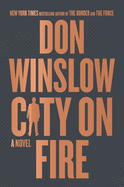
Operating at the peak of his game after a string of grimly captivating crime sagas, including The Force and the Border Trilogy, Don Winslow makes his Homerian ambitions explicit in City on Fire, transforming The Iliad into an operatic story about warring crime families. The conflict in City on Fire is pettier and grubbier than that of Homer's epic poem. Instead of "the face that launched a thousand ships," Winslow's conflagration begins with the harassment of a beautiful woman at an alcohol-soaked clambake at Rhode Island's Goshen Beach. After a series of escalations, protagonist Danny Ryan finds himself at the center of an increasingly vicious war between local Italian and Irish crime families. Winslow has always excelled at portraying the seedy exploits of mobsters and corrupt police on an operatic scale; here, he echoes characters and plot points from The Iliad, this time with drive-by shootings and car bombs.
City on Fire thrives on its regionalism, taking place almost entirely in tiny Rhode Island. Providence neighborhoods, particularly the historically Irish neighborhood of Dogtown, are depicted as fiefdoms ruled by ethnically-based gangs. Set in 1986, Winslow's story includes plenty of talk about "Dunkin' runs" and creative uses of the word wicked. But it's more than just local flavor: the novel's escalating tragedy hinges on the tight bonds of a community in which everybody seems to know everybody and parochialism can be mistaken for destiny. When the bodies start inevitably piling up, the stakes of this local gang war couldn't seem higher. --Hank Stephenson, manuscript reader, the Sun magazine

